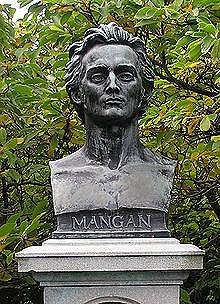| |

Traditions, folklore, history and more. If it's Irish, it's here. Or will be!
"People will not look forward to posterity who never look backward to their ancestors."
-Edmund Burke




Quotes
Library: Books, Movies, Music
Prints & Photos
Poetry
Jokes


Shops Ireland
Bunús na Gaeilge
(Basic Irish)
Circle of Prayer
Blessings
Did You Know?
Himself/Herself
Write to Us
Readers Write..
Links/Link to Us
Advertise with us
Awards & Testimonials
Submissions Guide

Help keep us free
Throughout the site you will see many items available for purchase from well-known merchants such as Amazon. Not interested in what we're featuring? It doesn't matter. Click on any link and then shop for whatever you wish - we will still get credit, if you buy something.
Thanks for your help.
|
|
|
 James Clarence Mangan (b. May 1, 1803 - d. June 20, 1849) James Clarence Mangan (b. May 1, 1803 - d. June 20, 1849)
...born in Dublin, the son of a poor grocer, his father having failed to retain a job in ‘eight successive establishments’; forced him to work as a clerk in the scrivening office of Thomas Kenrick (‘dull drudgery ... my heart felt as if it were gradually growing into the inanimate material I wrote on’).
He started learning languages with the guidance of a Fr. Graham who taught him Latin, Spanish, French and German. He wrote ‘charades, enigmas & riddles’ for almanacs and directories under pseudonyms.
He contributed to: The Dublin Penny Journal (as "Clarence"), The Satirist, Dublin University Magazine, Irish Monthly Magazine, and early editions of The Nation.
He fell ill during a cholera epidemic and was carried into the Meath Hospital, having been found by William Wilde in ‘a state of indescribable misery and squalor occupying a wretched hovel where he had retired to die’; he died in that hospital very soon after.
He was commemorated by Thomas MacDonagh in verse as the ‘poor splendid Poet of the burning eyes’; he was called by Yeats ‘our one poet raised to the first rank by intensity’, and by Joyce in an essay of 1907 ‘the failed standard-bearer of a failed nation’, but also ‘one of the world’s most inspired poets’.
Mangan has been called one of the greatest poets of the nineteenth century. His life may only be considered miserable. He was an opium addict at one time and a hard drinker. His fame is late in coming. Only his Dark Rosaleen was on the Irish Times list of favorite poems. To my taste he has better to choose from; he wrote over a thousand poems. Let this be a beginning for all those who are fond of poetry. The discovery of James Clarence Mangan will be rewarded.
Photo Credit: Memorial bust of Mangan in St. Stephen's Green, sculpted by Oliver Sheppard/Wikipedia
Siberia
by James Clarence Mangan
In Siberia's wastes
The Ice-wind's breath
Woundeth like the toothed steel
Lost Siberia doth reveal
Only blight and death.
Blight and death alone.
No Summer shines,
Night is interblent with Day.
In Siberia's wastes alway
The blood blackens, the heart pines.
In Siberia's wastes
No tears are shed,
For they freeze within the brain.
Nought is felt but dullest pain,
Pain acute, yet dead;
Pain as in a dream,
When years go by
Funeral-paced, yet fugitive,
When man lives, and doth not live,
Doth not live - nor die.
In Siberia's wastes
Are sands and rocks
Nothing blooms of green or soft,
But the snow-peaks rise aloft
And the gaunt ice-blocks.
And the exile there
Is one with those;
They are part, and he is part,
For the sands are in his heart,
And the killing snows.
Therefore, in those wastes
None curse the Czar.
Each man's tongue is cloven by
The North Blast, that heweth nigh
With sharp scymitar.
And such doom each drees,
Till, hunger-gnawn,
And cold-slain, he at length sinks there,
Yet scarce more a corpse than ere
His last breath was drawn.
(1845)
Dark Rosaleen
by James Clarence Mangan
O my Dark Rosaleen,
Do not sigh, do not weep!
The priests are on the ocean green,
They march along the deep.
There 's wine from the royal Pope,
Upon the ocean green;
And Spanish ale shall give you hope,
My Dark Rosaleen!
My own Rosaleen!
Shall glad your heart, shall give you hope,
Shall give you health, and help, and hope,
My Dark Rosaleen!
Over hills, and thro' dales,
Have I roam'd for your sake;
All yesterday I sail'd with sails
On river and on lake.
The Erne, at its highest flood,
I dash'd across unseen,
For there was lightning in my blood,
My Dark Rosaleen!
My own Rosaleen!
O, there was lightning in my blood,
Red lightning lighten'd thro' my blood.
My Dark Rosaleen!
All day long, in unrest,
To and fro, do I move.
The very soul within my breast
Is wasted for you, love!
The heart in my bosom faints
To think of you, my Queen,
My life of life, my saint of saints,
My Dark Rosaleen!
My own Rosaleen!
To hear your sweet and sad complaints,
My life, my love, my saint of saints,
My Dark Rosaleen!
Woe and pain, pain and woe,
Are my lot, night and noon,
To see your bright face clouded so,
Like to the mournful moon.
But yet will I rear your throne
Again in golden sheen;
'Tis you shall reign, shall reign alone,
My Dark Rosaleen!
My own Rosaleen!
'Tis you shall have the golden throne,
'Tis you shall reign, and reign alone,
My Dark Rosaleen!
Over dews, over sands,
Will I fly, for your weal:
Your holy delicate white hands
Shall girdle me with steel.
At home, in your emerald bowers,
From morning's dawn till e'en,
You'll pray for me, my flower of flowers,
My Dark Rosaleen!
My fond Rosaleen!
You'll think of me through daylight hours,
My virgin flower, my flower of flowers,
My Dark Rosaleen!
I could scale the blue air,
I could plough the high hills,
O, I could kneel all night in prayer,
To heal your many ills!
And one beamy smile from you
Would float like light between
My toils and me, my own, my true,
My Dark Rosaleen!
My fond Rosaleen!
Would give me life and soul anew,
A second life, a soul anew,
My Dark Rosaleen!
O, the Erne shall run red,
With redundance of blood,
The earth shall rock beneath our tread,
And flames wrap hill and wood,
And gun-peal and slogan-cry
Wake many a glen serene,
Ere you shall fade, ere you shall die,
My Dark Rosaleen!
My own Rosaleen!
The Judgement Hour must first be nigh,
Ere you can fade, ere you can die,
My Dark Rosaleen!
(1846)
Woman of Three Cows
by James Clarence Mangan
O woman of Three Cows, agra! don’t let your tongue thus rattle!
O, don’t be saucy, don’t be stiff, because you may have cattle.
I have seen - and, here’s my hand to you, I only say what’s true -
A many a one with twice your stock not half so proud as you.
Good luck to you, don’t scorn the poor, and don’t be their despiser,
For worldly wealth soon melts away, and cheats the very miser,
And Death soon strips the proudest wreath from haughty human brows;
Then don’t be stiff, and don’t be proud, good Woman of Three Cows!
See where Momonia’s heroes lie, proud Owen More’s descendants,
’Tis they that won the glorious name, and had the grand attendants!
If they were forced to bow to Fate, as every mortal bows,
Can you be proud, can you be stiff, my Woman of Three Cows!
The brave sons of the Lord of Clare, they left the land to mourning;
Mavrone! for they were banished, with no hope of their returning
Who knows in what abodes of want those youths were driven to house?
Yet you can give yourself these airs, O Woman of Three Cows!
O, think of Donnell of the Ships, the Chief whom nothing daunted
See how he fell in distant Spain, unchronicled, unchanted!
He sleeps, the great O’Sullivan, where thunder cannot rouse -
Then ask yourself, should you be proud, good Woman of Three Cows!
O’Ruark, Maguire, those souls of fire, whose names are shrined in story
Think how their high achievements once made Erin’s highest glory
Yet now their bones lie mouldering under weeds and cypress boughs,
And so, for all your pride, will yours, O Woman of Three Cows!
The O’Carrolls, also, famed when Fame was only for the boldest,
Rest in forgotten sepulchres with Erin’s best and oldest;
Yet who so great as they of yore in battle or carouse?
just think of that, and hide your head, good Woman of Three Cows!
Your neighbour’s poor, and you, it seems, are big with vain ideas,
Because, inagh! you’ve got three cows - one more,! see, than she has.
That tongue of yours wags more at times than Charity allows,
But if you’re strong, be merciful, great Woman of Three Cows!
Now, there you go! You still, of course, keep up your scornful bearing,
And I’m too poor to hinder you; but, by the cloak I’m wearing,
If I had but four cows myself, even though you were my spouse,
I’d thwack you well to cure your pride, my Woman of Three Cows!
For more Poetry Click the Poetry Index.
|
|
Sun, Mar 4, 2018
Pádraic Pearse, who played a prominent part in the 1916 rebellion, declared Ireland a Republic from the steps of the General Post Office in Dublin. He was executed, along with the other leaders, for his part in the Rising. But he was a gentle warrior at heart. These five stories show us that Pearse was a man of deep understanding with immense human awareness of the way of life of the average person. He analyses the sorrows and joys of the Irish people of his time, and writes of the tragedies of life and death from which they could never escape.
Review from Mercier Press
Click for Stories of P. Pearse.
|
Interested in Irish Poetry?Here's the easy way to collect them all (well, almost all, anyway).
Malachy McCourt says in his introduction, "With the republication of this book, the Irish recover under their roof of stars all the great poets and writers who have been falsely claimed by the saxon crown and its minions - even our reprobates."
Amazon states this is out of stock. They still have used copies for almost nothing (except shipping - chuckle). If you would like a new edition, it was available at Powell's. We can't promise it's still there. Click here for Powell's 1000 Years.
Click here for used at Amazon.
|
|
|



